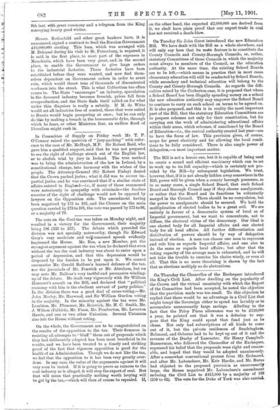On Thursday the Chancellor of the Exchequer introduced the King's
Civil List. After dwelling on the popularity of the Crown and the virtual unanimity with which the Report of the Committee had been accepted, he noted the objection that the provision made was too small. To this objection he replied that there would be no advantage in a Civil List that might tempt-the Sovereign either to spend too lavishly or to accumulate unnecessarily large savings. Alluding to the fact that the Privy Purse allowance was to be £110,000 a year, he pointed out that it was a delusion to sup- pose that the King could spend that fund just as he chose. Not only had subscriptions of all kinds to come out of it, but the private residences of Sandringham, Balmoral, and Osborne had to be kept up out of it and the revenue of the Duchy of Lancaster. Sir Henry Campbell. Bannerman, who followed the Chancellor of the Exchequer, expressed his belief that the proposals were right and reason- able, and hoped that they would be adopted unanimously. After a somewhat conventional protest from Mr. Redmond, and after Mr. Labouchere, Mr. Keir Hardie, and Mr. Burns had objected to the proposed provision as unnecessarily large, the House negatived Mr. Labonchere's amendment reducing the Civil List to £415,000 by a majority of 188 (2.50 to 62). The vote for the Duke of York was also carried.






































 Previous page
Previous page